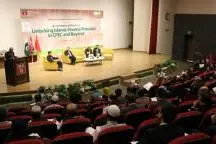PHOTO
17th Jan, 2017: IBA Centre for Excellence in Islamic Finance, Karachi, Pakistan conducted an International Forum on Unlocking Islamic Finance Potential in CPEC and beyond on the 17th of January, 2017 to critically analyse and discuss the possibilities of Islamic Financing opportunities present in the current economic landscape of the project between China and Pakistan.
Mr. Ahmed Ali Siddiqui, the Director of IBA CEIF in his opening statement highlighted that we have to act fast to capture these opportunities presented by CPEC, given that it is only a part of the One Belt One Road project, that passes through 27 Muslim countries, so Islamic Finance cannot be ignored.
Dr. Farrukh Iqbal, Dean & Director, IBA said Islamic finance is a vehicle for long term development, with enormous potential, that has not been explored fully in Pakistan.
Mr. Saeed Ahmad, Deputy Governor of SBP, said that Islamic finance industry has globally reached a size of over USD 2 trillion. In October 2016, Pakistan already issued USD 1 billion worth of Sukuk. He said a very critical area the Islamic banks can use Islamic financing is to adjust the risk-sharing structuring of these projects. He mentioned Regulation, Taxation, Capital Markets and Awareness as the four main sub-committees of the Implementation Committee for Islamic Finance.
The China Pakistan Economic Corridor is a developmental project for both China and Pakistan. With the continuous addition of new projects, the amount of investment has increased to US$ 70 billion. It gives China access to 3 billion people in Middle East, South Asia and Africa. The plan is to reduce trade distance by 1000 miles and inventory requirements owing to reduced transportation time. Dr. Muhammad Nadeem Javaid, Chief Economist, Planning Commission of Pakistan mentioned the CPEC has four covenants. The first is and most important of which is energy – to take the fuel mix away from furnace/oil based to less expensive coal-based. Rs. 9.69/- per unit cost of energy is to be reduced to 9.1/- per unit, and increase power production by 8,000 MW. The other three would be Infrastructure Development, the Gawadar Port and Industrial Cooperation. Mr. Li Xiaoxin David, Deputy CEO ICBC said that a number of Chinese investors, entrepreneurs etc. come to them to open a bank account. CPEC is aiming at improving the infrastructure of these areas. Development of road and rail networks comes under infrastructure developmental projects highlighted by the CPEC, and spill-over benefits which will, as a by-product, have an impact on housing, cement, steel, stone crushing and other industries.
Relocation of businesses from China is another potential opportunity which will result in job opportunities for over 85 million employees globally. Many Chinese firms have approached ICBC for setting up business in Pakistan. It is estimate that if only 4 percent of Chinese trade is routed through Pakistan, it will amount to $180 billion. According to Mr. Nadeem, Chinese banks claim tax exemptions on the interest income on lending to CPEC projects in energy sector. This tax break is a huge incentive for Chinese banks and businesses to enter the Pakistan market.
Full play/Serious hard work will be required from all stakeholders including regulators, academia, practitioners and Shariah scholars to best capitalize on this opportunity. IFIs will have the opportunity to deploy excess liquidity in innovative Sukuk such as multi-currency variants.
However, there are several challenges which need to be addressed to realise the full potential of the opportunities presented by the CPEC. There are capital constraints, which need to be addressed before IFIs can participate in financing CPEC projects. Due to maturity mismatch, meeting financing requirements through deposits will not be possible, instead, developing innovative Sukuk which can address accrual issues is the need of the hour. For the country, debt to GDP ratio is a challenge which can be addressed through PPP, BOT and other project financing models. According to Mr. Nadeem, Chinese banks claim tax exemptions on the interest income on lending to CPEC projects in energy sector. This tax break is a huge incentive for Chinese banks and businesses to enter the Pakistan market.
Dr. Sulaiman Liu, from Al Sadiq Consulting China, presented the Chinese banks’ view of looking at the CPEC projects. He explained that they preferred RMB-based investments, e.g. RMB Sukuk, to lock in the currency exchange rate risk. He mentioned that Pakistani and Chinese government have signed currency swap agreements – these stabilize the economy in the possibility of currency devaluations. Mr. Irfan Siddiqui, CEO Meezan, mentioned that the Pakistan government had issued foreign currency Sukuk recently, so the possibility of issuing RMB Sukuk which are appropriate to these CPEC projects was certainly there.
Capacity of ancillary service providers will have to be built such as rating agencies and Credit Information Bureau. Takaful operators will have to also gear up to deal with CPEC related volumes. Given strong fundamentals of such projects, teaming up with foreign operators could be a possibility.
© Press Release 2017




















